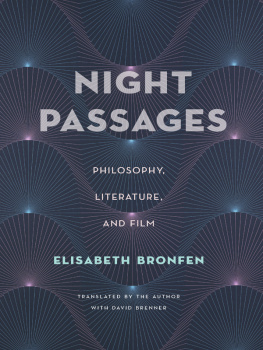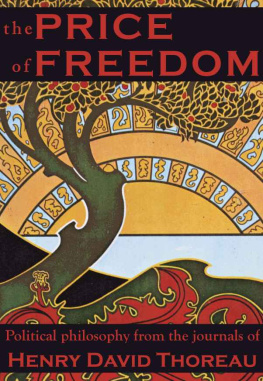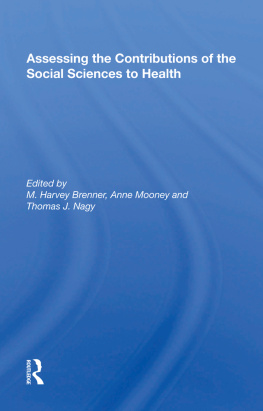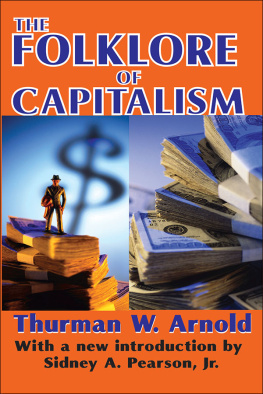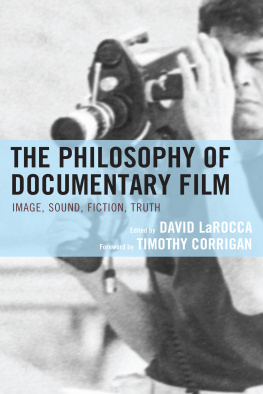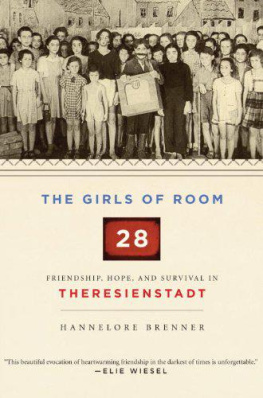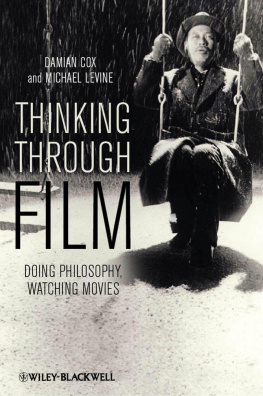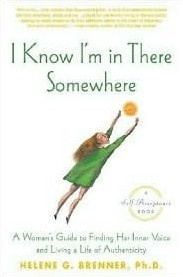NIGHT PASSAGES
PHILOSOPHY, LITERATURE, AND FILM
ELISABETH BRONFEN
TRANSLATED BY THE AUTHOR WITH DAVID BRENNER
COLUMBIA UNIVERSITY PRESS NEW YORK
COLUMBIA UNIVERSITY PRESS
Publishers Since 1893
New York Chichester, West Sussex
cup.columbia.edu
Copyright 2008 Carl Hanser Verlag Mnchen
English translation copyright 2013 Columbia University Press
All rights reserved
E-ISBN 978-0-231-51972-4
Library of Congress Cataloging-in-Publication Data
Bronfen, Elisabeth.
[Tiefer als der tag gedacht. English]
Night passages : philosophy, literature, and film / Elisabeth Bronfen ; translated by the author with David Brenner.
pages cm
Includes bibliographical references and index.
ISBN 978-0-231-14798-9 (cloth : alk. paper) ISBN 978-0-231-14799-6 (pbk. : alk. paper) ISBN 978-0-231-51972-4 (e-book)
1. Night in literature. 2. NightPhilosophy. 3. Dawn in literature. 4. Light and darkness in literature. 5. Film noirHistory and criticism. 6. Night in art. I. Title.
PN56.N5B76 2013
809.9333dc23
2012050804
A Columbia University Press E-book.
CUP would be pleased to hear about your reading experience with this e-book at .
Cover image: Gift of the Philadelphia Museum of Arts Exchange, 1978/ The Bridgeman Art Library. Night Sea, 1977. Edna Andrade, 1917-2008.
Cover design and book design: Lisa Hamm
For Ingborg Margot Krienes Bronfen 19212005
CONTENTS


T he night is not simply a time for sleeping. For all those who do not wish to reveal their thoughts to their pillows alone, a vibrant time opens up after darkness. At night the diurnal world undergoes reflection and commentary. At night we encounter another way of reckoning time; a time that cannot be reckoned; a time of reckoning. Indeed, some people actually need a portion of night on a daily basis so they can be enclosed in silence, apart from everyone else. Whether we regularly stay awake after dark or do so only sporadically, on the threshold between the past day and the next, consigned neither to unconscious sleep nor to the routine of mundane consciousness, the night offers each of us a heightened attentiveness. We are alone with our thoughts, feelings, and sensuous perceptions. More intensely than during the day, we experience the passing of time, an uncertain proximity of space that we occupy completely for ourselves. Uninhibited, under the protection of darkness, we can give ourselves over to memories or fantasies, but also to doubts, wild conjectures, and anxieties. Contours and borders become blurred, flowing together with the certainties of the day. We can think in ambivalences and contradictions, entertain the invention of impossible worlds, and discover in spirit those realms that are foreign to our ordinary lives.
It is from my mother that I first learned the charm of living the night. In the morning, we were never sent off to school with one of those kind-but-firm maternal looks. My mother slept late, until midday, and only really came alive at night. She was my first queen of the night. Whenever she went to a party, the theater, or the opera, she would come and check on us in our room after my siblings and I were already long in bed. There was never enough time for a bedtime story. Instead, she sat with us and gently spoke to us, easing the transition into sleep. After she left our room, a trace of her perfume hung in the air, the sound of the tulle and silk of her evening gown continued to resonate in our ears; the image of her elegant appearance lingered in our imagination. Her splendid evening gown served as a promise: Awaiting us, too, was a fascinating world of parties, boisterous pleasure, and risky gambling, later on, when we were older. This luminous figure, whose jewelry sparkled uncannily in the light from the nightstand lamp and who seemed both elevated and enchanted, was not the mother with whom we were familiar. Her brief appearance signaled that she was about to enjoy a nocturnal existence separate from ours. By way of intimation, she let us partake in the heightened mood awaiting her. This seductive perception would launch our dreams.
Later, nighttime continued to be my mothers time. If I was out with friends for the evening at a party, and we were bored but didnt want to go home yet, I could call on her at any hour. She would greet us at the front door, dressed in a stylish house robe, and lead us into the living room where she reopened the bar. We would stay for hours on end, having unreal conversations whose charm consisted in saying everything without inhibition because we were enveloped in quiet darkness. From my mother, I learned to share intimacies with others, to develop thoughts making me attentive to things hitherto unfamiliar, whenever I found myself in a night different from the ordinary night. Ive often asked myself what she was doing those many hours all alone, what she gleaned from the organizing, reading, or contemplation she seemed to need every night. She would have wanted to read a book about the night. It would have been her kind of book. After learning in the hospital that the cancer shed had for years had suddenly metastasized, she told me soberly: Now I wont be able to read the book you wanted to write for me. The harbinger of my dreams of exotic delights became, unexpectedly and inexorably, the mother of death; the herald of another night completely inaccessible to me.
Yet the memories of my mothers penchant for the night indelibly left their mark on my turn to philosophical and aesthetic texts that discover the night so as to reveal a thinking of the other, of the outside. Unlike any phenomenological experience of the world after dark, the night linguistically created in philosophical, fictional, and cinematic texts is at once bounded and unbound; a sanctuary, a promise, and a chance. Even if it must inevitably give way to the light of the dawn, this aesthetically reimagined night veers toward the infinite, insofar as we are willing to engage with the intensities and ideas it contains. Indeed, in such a conceptually rediscovered night, memories of departed or lost worlds return. It harbors the hope that the past will continue to affect the future. In December 1513, from his exile in San Andrea in Percussina, Niccol Machiavelli wrote in a letter to his patron, Francesco Vettori:

